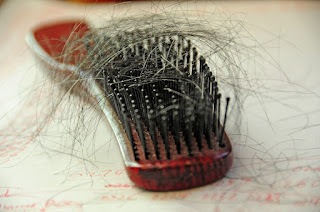The Stigma of Hair Loss in Women - Hair Constantly Falling Out
Hair loss in women is usually a result of one or more of the following: genetics, stress, hormones or pregnancy. Sometimes it is a symptom of an underlying medical condition that you see your hair constantly falling out, but even if it is not life threatening, there is still a huge stigma attached to a woman losing her hair.
This can put a woman under a lot of stress which can make the shedding more severe, making daily life that much tougher.
Today's western society has become accustomed to airbrushed, perfected images of celebrities, especially women, and most school girls grow up with aspirations to look like some pretty pop star or model on the basis of 'they look good which makes them popular so I want to be and look like them'.
This image-obsessed culture makes it particularly difficult for those women who are experiencing the trauma of sudden extreme hair loss.
From the outside we often sympathise with those who have lost hair as a result of medical condition or medications such as cancer drugs, or we alienate those who are experiencing hair loss for some other reason such as genetics. But why can't we celebrate bald women?
One female British bald celebrity, Gail Porter, has done much to raise awareness of the condition Alopecia Areata and in doing so has helped to start to bring the subject out of the closet. Alopecia Areata, an autoimmune disease that causes sudden, patchy hair loss, affects around one in a hundred people, mostly teenagers and young adults.
It runs in the family in one in five cases. For up to 70% of sufferers the hair will grow back of its own accord however it can lead to more severe causes of hair loss such as Alopecia Totalis (no scalp hair) and Alopecia Universalis (no scalp and body hair).
Porter, previously a successful model with long blond locks, famously had her image projected on Big Ben by lads' magazine FHM in 1999. However, beneath the glossy exterior, Porter's struggle with drugs, stress, and post-natal depression had begun to trigger her alopecia.
The mother-of-one has been honest about the challenge she faced in coming to terms with her baldness and made a television documentary about the emotional and physical challenges she endured.
She felt extremely isolated and considered wearing a wig but found them uncomfortable and unrealistic.
As well as alopecia, there are several other types of hair loss in women, the most common being Female Pattern (genetic) Hair Loss. Most women will start to experience hair loss between 30 and 50 however it can affect women at a younger age.
As with all forms of hair loss, the earlier it is treated, the better the chances of restoring the hair. But early treatment means an early diagnosis and many women feel embarrassed to admit there is a problem and may even slip into denial.
For women, there are so many hair styling aids out there (hats, clips, bands, extensions) to easily disguise the early stages of hair loss.
The fact that bald woman are not often positively projected in the public eye, as compared to bald men, could be linked to the ever-increasing demand for any female with a public persona to be young and 'beautiful'.
Pop-stars, models, actresses and news-readers are, more often than not, chosen in part for their conventional good looks. In recent times, for example, the BBC has habitually replaced female news-readers, television presenters and radio broadcasters with notably younger-looking versions.
They may claim they are doing this because it is what the audience wants, however this is not an acceptable excuse; there are strict (and rightly so) guidelines on racial and ethnic diversity; so why not on age and appearance? When media and popular culture more accurately reflects society's diversity then perhaps the public will be more understanding of hair loss in women and those suffering from the condition will feel more able to seek advice.
Any internet search will show a growing number of hair loss support groups that can offer advice and encouragement.
There are also specialist clinics that offer expert advice about treatment programs. If you decide to explore any kind of treatment, it is important to conduct some research into the products and the clinic you are intending to consult.
For women, there are several factors that could be contributing to the hair loss and professional advice from a reputable source is the safest and most effective way of treating the condition.
Sophie is one of the Belgravia Hair Loss Blog's expert authors. The Belgravia Center is a hair loss clinic and pharmacy in the UK and home to one of the world's leading hair loss websites and blogs.





Comments
Post a Comment